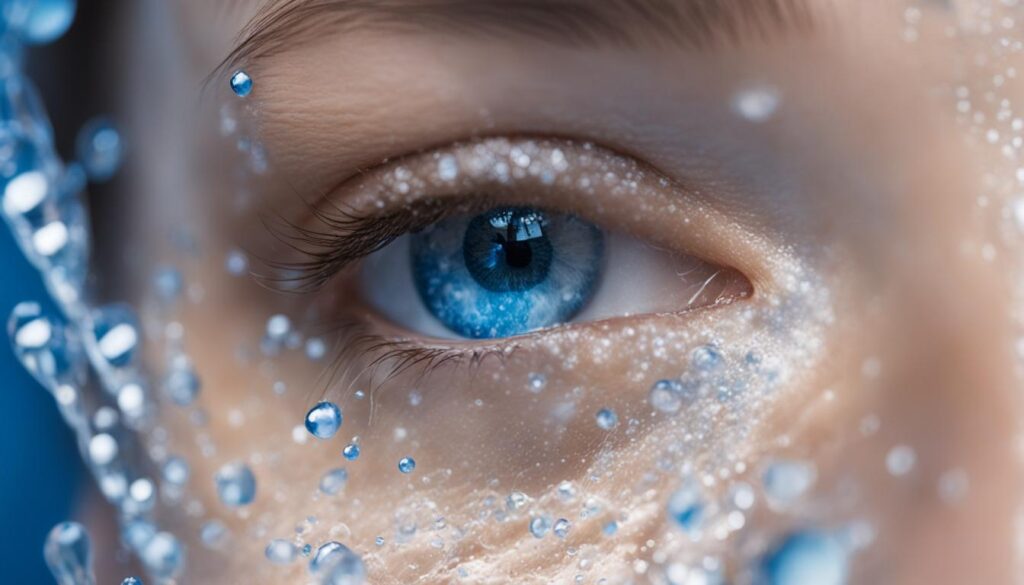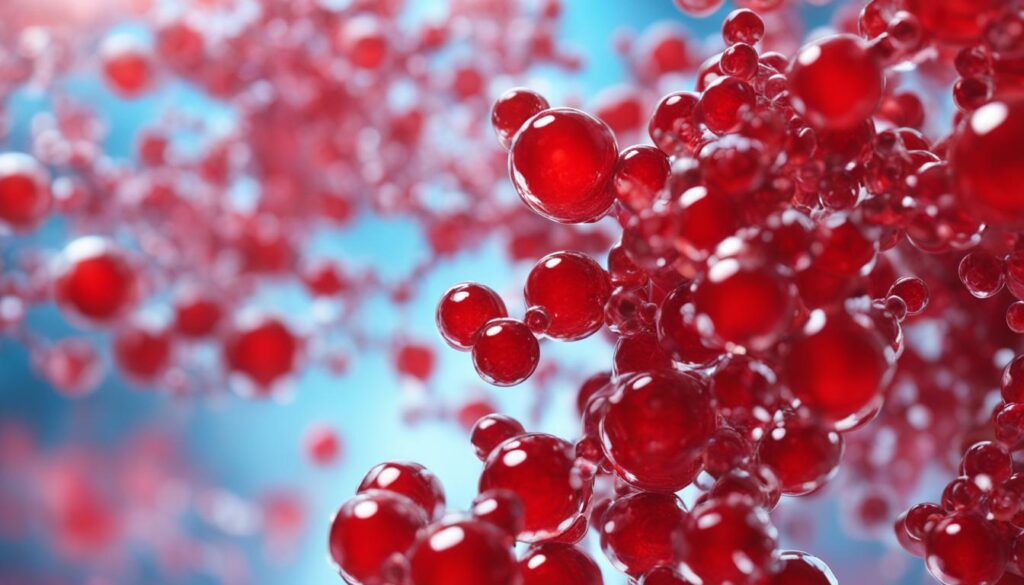As a skincare enthusiast, I often hear questions like “Can hyaluronic acid cause acne?” or “Is hyaluronic acid good for acne-prone skin?” These concerns arise because acne is a common skin problem that many of us face at some point in our lives. In this article, I will delve into the relationship between hyaluronic acid and acne to help you better understand how this popular skincare ingredient can affect your skin.
Key Takeaways:
- Hyaluronic acid is not comedogenic and does not clog pores, making it unlikely to cause acne breakouts.
- Using hyaluronic acid in conjunction with other acne-fighting treatments can maximize its effectiveness for acne-prone skin.
- Choose hyaluronic acid products that are free from potentially comedogenic ingredients.
- Hyaluronic acid has moisturizing, soothing, and anti-inflammatory properties that can benefit acne-prone skin.
- Consulting with a dermatologist can provide personalized recommendations for using hyaluronic acid in skincare routines.
What Is Hyaluronic Acid

Hyaluronic acid is a naturally occurring substance in the body, primarily found in the skin, connective tissues, and eyes. It plays a significant role in maintaining hydration and elasticity in the skin. Hyaluronic acid can hold up to 1000 times its weight in water, making it a popular ingredient in skincare products for moisturization and maintaining the skin’s hydration levels. It also helps improve skin elasticity, reduce the appearance of wrinkles, and promote healthier, rejuvenated skin. Hyaluronic acid can be a valuable addition to skincare routines for various skin concerns, including acne.
Research has shown that hyaluronic acid has numerous benefits for the skin. Its moisturizing properties help to keep the skin hydrated, preventing dryness and flakiness. This can be especially beneficial for individuals with acne-prone skin, as excessive dryness can contribute to the development of acne. In addition, hyaluronic acid has soothing and calming properties, which can help reduce inflammation and redness associated with acne breakouts.
Hyaluronic acid is compatible with other skincare ingredients and treatments, making it versatile for addressing various skin concerns. Its non-comedogenic nature means that it does not clog pores or cause breakouts, making it suitable for acne-prone individuals. However, it is important to choose hyaluronic acid products that are free from potentially comedogenic ingredients and to incorporate it into a comprehensive skincare routine that includes other acne-fighting treatments for optimal results.
| Hyaluronic Acid Benefits for Skin | Hyaluronic Acid Risks for Skin |
|---|---|
|
|
Using Hyaluronic Acid for Acne Treatment
When using hyaluronic acid for acne treatment, it is important to consider product formulation and individual skin type. Non-comedogenic and fragrance-free options are recommended to avoid potential breakouts. Oily and combination skin types may benefit from hyaluronic acid’s hydration properties, while those with dry skin should ensure proper moisturization to prevent dehydration. Additionally, hyaluronic acid should be incorporated into a comprehensive skincare routine that includes cleansing, exfoliating, and other acne-fighting treatments for optimal results. Following recommended usage guidelines and consulting with a dermatologist can help customize a skincare regimen that includes hyaluronic acid for acne-prone skin.
Overall, hyaluronic acid is a valuable skincare ingredient with numerous benefits for the skin, including acne-prone skin. Its moisturizing and soothing properties make it suitable for maintaining hydration, reducing inflammation, and promoting overall skin health. While individual experiences may vary, hyaluronic acid can be safely incorporated into skincare routines to help improve the appearance of acne and achieve healthier, balanced, and more radiant skin.
Potential Causes of Acne
Acne is a common skin condition that can be caused by a variety of factors, including hormonal changes, genetics, and environmental factors. When it comes to the potential causes of acne, it is important to consider the impact of hyaluronic acid on the skin. While hyaluronic acid itself is not known to cause acne, certain factors related to its use may increase the risk of breakouts in some individuals.
One factor to consider is the specific formulation of the hyaluronic acid product. Some hyaluronic acid formulas may contain comedogenic ingredients, which have the potential to clog pores and lead to acne breakouts. It is important to choose products that are free from comedogenic ingredients and have been tested for their non-comedogenic properties.
Another consideration is the type of hyaluronic acid being used. Low molecular weight hyaluronic acid (LMWHA) has been found to induce inflammation in the skin and may potentially exacerbate acne breakouts. On the other hand, high molecular weight hyaluronic acid (HMWHA) is less likely to cause acne but may result in skin dehydration, especially in dry climates.
While the research on the effects of hyaluronic acid on acne is limited, it is recommended to consult with a dermatologist to determine the most suitable products for your specific skin type and concerns. A dermatologist can provide personalized recommendations and guide you in selecting hyaluronic acid products that are less likely to cause acne and are compatible with your skincare routine.
Table: Factors That Can Influence Acne Risk with Hyaluronic Acid
| Factor | Impact |
|---|---|
| Formulation | Comedogenic ingredients may clog pores and lead to breakouts |
| Type of Hyaluronic Acid | Low molecular weight hyaluronic acid (LMWHA) may induce inflammation, while high molecular weight hyaluronic acid (HMWHA) is less likely to cause acne |
| Individual Skin Type | Oily and combination skin types may be more prone to clogged pores and bacterial growth |
| Application Technique | Overuse or applying hyaluronic acid to unclean skin can lead to clogged pores and breakouts |
By considering these factors and seeking professional guidance, you can minimize the risk of acne breakouts while incorporating hyaluronic acid into your skincare routine. Remember to thoroughly research and choose products that are specifically formulated to be non-comedogenic and suitable for acne-prone skin.
Hyaluronic Acid and Acne-Prone Skin
Hyaluronic acid is a versatile ingredient that can benefit those with acne-prone skin. It does not directly cause acne and can actually help improve acne-related concerns. By providing intense hydration, hyaluronic acid helps to maintain the skin’s natural moisture balance, preventing excessive dryness that can contribute to acne breakouts. Its moisturizing properties also help to soothe irritation and inflammation associated with acne, promoting a calmer complexion.
Additionally, hyaluronic acid can aid in reducing the appearance of acne scars, promoting a smoother texture and overall complexion. It is a non-comedogenic ingredient, meaning it does not clog pores or cause breakouts, making it suitable for acne-prone skin. However, it is important to combine hyaluronic acid with other non-comedogenic skincare products and acne-fighting treatments for optimal results.
When incorporating hyaluronic acid into your skincare routine, it is crucial to choose high-quality products that are free from potentially comedogenic ingredients. Patch testing is recommended to ensure compatibility and to identify any allergies or sensitivities. By following a consistent skincare routine and consulting with a dermatologist for personalized recommendations, you can safely and effectively benefit from hyaluronic acid for treating acne-prone skin.
Factors That May Increase Acne Risk with Hyaluronic Acid
When using hyaluronic acid, it is important to consider certain factors that may increase the risk of acne breakouts. The formulation of a hyaluronic acid product plays a crucial role in its impact on the skin. Some ingredients, such as comedogenic oils or fragrances, have the potential to trigger breakouts in individuals with acne-prone skin. To minimize the risk, it is advisable to choose hyaluronic acid products that are non-comedogenic and fragrance-free.
Skin type also influences acne risk. Oily and combination skin types are more prone to clogged pores and bacterial growth, which can lead to acne breakouts. Therefore, individuals with these skin types should be particularly cautious when using hyaluronic acid and ensure they maintain a consistent cleansing routine to prevent pore blockage.
Table: Factors That May Increase Acne Risk with Hyaluronic Acid
| Factors | Recommendations |
|---|---|
| Formulation of hyaluronic acid product | Choose non-comedogenic and fragrance-free options |
| Skin type | Be cautious with oily and combination skin, maintain a consistent cleansing routine |
| Application technique | Follow recommended usage guidelines, avoid overuse and applying to unclean skin |
In addition, the application technique is crucial for preventing acne breakouts. Overusing hyaluronic acid or applying it to unclean skin can lead to clogged pores and the development of acne. It is essential to follow the recommended usage guidelines provided by the product manufacturer and ensure proper cleansing before applying hyaluronic acid.
By considering these factors and incorporating hyaluronic acid into a skincare routine with care, individuals can enjoy the benefits of this ingredient while minimizing the risk of acne breakouts.
Benefits of Hyaluronic Acid for Skin

When it comes to skincare, hyaluronic acid offers a multitude of benefits for the skin. Its ability to retain moisture makes it a powerful ingredient for hydration, resulting in improved skin texture and reduced dryness. Hyaluronic acid’s moisturizing properties also help to plump the skin, reducing the appearance of fine lines and wrinkles. Additionally, it has soothing and calming effects on the skin, which can be particularly beneficial for acne-prone skin.
Hyaluronic acid’s ability to balance sebum production and enhance the skin’s barrier functions contributes to a healthier complexion. It promotes gentle exfoliation, reducing scarring and brightening the skin. Furthermore, hyaluronic acid is non-comedogenic, meaning it does not clog pores, making it suitable for acne-prone skin. This versatile ingredient is also compatible with other treatments and can be easily incorporated into skincare routines.
Overall, hyaluronic acid is a valuable addition to any skincare regimen, offering numerous benefits for the skin. Its ability to hydrate, plump, soothe, and improve skin texture makes it an ideal choice for those seeking healthier and more radiant skin.
| Benefits of Hyaluronic Acid for Skin |
|---|
| Intense hydration |
| Reduced dryness |
| Improved skin texture |
| Reduced appearance of fine lines and wrinkles |
| Soothing and calming effects |
| Balance sebum production |
| Enhanced skin barrier function |
| Gentle exfoliation |
| Reduction in scarring |
| Brightened skin |
How to Use Hyaluronic Acid Safely
Hyaluronic acid is a popular skincare ingredient known for its hydrating and moisturizing properties. While it is generally safe to use, there are a few factors to consider to ensure its safe and effective use, especially for those with acne-prone skin.
Firstly, it is recommended to perform a patch test before incorporating hyaluronic acid into your skincare routine. Apply a small amount of the product on a small area of your skin, preferably on the inner forearm, and observe for any adverse reactions such as redness or irritation. If no reaction occurs within 24 hours, it is generally safe to use on your face.
When using hyaluronic acid, it is important to start with a lower concentration product and gradually increase the frequency of usage. This allows your skin to adjust to the ingredient and reduces the risk of any potential side effects. Additionally, it is advisable to avoid mixing hyaluronic acid with products that contain vitamin C or alpha hydroxy acids (AHAs), as this combination may cause irritation or sensitivity.
| Tips for Using Hyaluronic Acid Safely | |
|---|---|
| 1 | Perform a patch test before using hyaluronic acid on your face. |
| 2 | Start with a lower concentration product and gradually increase usage frequency. |
| 3 | Avoid mixing hyaluronic acid with products that contain vitamin C or AHAs. |
| 4 | Apply sunscreen during the day to protect your skin. |
| 5 | Consult with a healthcare professional if you are pregnant or breastfeeding. |
Furthermore, it is essential to apply sunscreen when using hyaluronic acid during the day. Hyaluronic acid can increase the skin’s sensitivity to the sun, so protecting your skin with sunscreen is crucial to prevent damage and premature aging.
If you are pregnant or breastfeeding, it is advisable to consult with a healthcare professional before using hyaluronic acid products to ensure their safety for you and your baby.
By following these tips and guidelines, you can safely and effectively incorporate hyaluronic acid into your skincare routine. Remember to choose high-quality products and listen to your skin’s needs to achieve the best results.
Product Recommendations and Tips for Using Hyaluronic Acid
When it comes to incorporating hyaluronic acid into your skincare routine, there are various products available that cater to specific skincare concerns. Below are some recommended hyaluronic acid skincare products:
| Product | Description |
|---|---|
| Pure Hyaluronic Acid Serum | A lightweight serum that provides intense hydration and helps improve skin texture. |
| Vitamin C Super Serum | A combination of hyaluronic acid and vitamin C, which brightens the skin and reduces the appearance of dark spots. |
| Multi-Active Hydrating Night Cream | A nourishing night cream that replenishes moisture and promotes skin rejuvenation while you sleep. |
| 2.5% Retinol Facial Serum | A serum that combines hyaluronic acid with retinol, offering multiple benefits such as hydration, anti-aging, and improved skin texture. |
| Brightening Eye Treatment Gel | A gel specifically formulated to target fine lines, dark circles, and puffiness around the delicate eye area. |
When using hyaluronic acid, it is important to follow these tips for best results:
- Cleanse and exfoliate your skin before applying hyaluronic acid to ensure it penetrates effectively.
- Hydrate your skin with water or a hydrating toner before applying hyaluronic acid to maximize its moisturizing benefits.
- Choose a hyaluronic acid product with suitable molecular weights based on your skin’s needs.
- If you have specific acne spots, consider spot treating them with a hyaluronic acid serum for targeted hydration.
- Follow a proper layering order in your skincare routine, applying hyaluronic acid before heavier creams or oils.
- Apply sunscreen during the day when using hyaluronic acid, as protected skin is less prone to damage and premature aging.
- Be consistent with the use of hyaluronic acid to maintain its benefits for your skin.
By incorporating these recommendations and tips into your skincare routine, you can maximize the benefits of hyaluronic acid and achieve healthier and more radiant skin.
Conclusion
In conclusion, hyaluronic acid is a safe and effective ingredient for treating acne-prone skin. Contrary to popular belief, hyaluronic acid does not cause acne but instead offers numerous benefits for improving skin health. Its ability to retain moisture and hydrate the skin helps prevent excessive dryness, a contributing factor to acne breakouts. Additionally, hyaluronic acid’s soothing and calming properties can reduce redness and inflammation commonly associated with acne-prone skin.
When incorporating hyaluronic acid into your skincare routine, it is important to consider the specific formulation of the product and your individual skin type. Opt for non-comedogenic options that do not contain potentially pore-clogging ingredients. Consulting with a dermatologist can provide personalized recommendations tailored to your unique needs.
By using hyaluronic acid in conjunction with other non-comedogenic and acne-fighting skincare products, you can maximize its effectiveness in treating acne and achieving healthier, balanced skin. Remember to cleanse and exfoliate your skin, apply sunscreen during the day, and follow a proper layering order in your skincare routine for optimal results. With its impressive hydrating and skin-rejuvenating properties, hyaluronic acid can be a valuable addition to your acne treatment arsenal.
FAQ
Can hyaluronic acid cause acne?
No, hyaluronic acid is not known to cause acne. In fact, it can be beneficial for acne-prone skin by providing hydration and soothing irritation.
What is hyaluronic acid?
Hyaluronic acid is a naturally occurring substance in the body that helps maintain hydration and elasticity in the skin. It is commonly used in skincare products for moisturization and anti-aging purposes.
What are the potential causes of acne?
Acne can be caused by hormonal changes, age, genetics, and other factors. The effects of hyaluronic acid on acne can vary and depend on individual skin concerns.
How does hyaluronic acid affect acne?
Hyaluronic acid does not directly cause acne. It can help improve skin hydration, reduce inflammation, and promote healthier skin, which may aid in reducing acne problems.
What factors may increase acne risk with hyaluronic acid?
Factors that can influence acne risk include the formulation of hyaluronic acid products, individual skin type, and application technique. It is important to choose non-comedogenic options and follow proper skincare routines.
What are the benefits of hyaluronic acid for skin?
Hyaluronic acid provides intense hydration, improves skin texture, reduces dryness, and has anti-aging effects. It can also help reduce the appearance of acne scars and promote a smoother complexion.
How can hyaluronic acid be used safely?
It is recommended to perform a patch test before using hyaluronic acid, start with a lower concentration product, and gradually increase usage. It should be used in conjunction with other non-comedogenic and acne-fighting skincare products.
Are there any product recommendations and tips for using hyaluronic acid?
Some recommended hyaluronic acid skincare products include Pure Hyaluronic Acid Serum, Vitamin C Super Serum, Multi-Active Hydrating Night Cream, 2.5% Retinol Facial Serum, and Brightening Eye Treatment Gel. It is important to cleanse and exfoliate the skin, hydrate before application, and apply sunscreen during the day.
What is the conclusion regarding hyaluronic acid and acne?
Hyaluronic acid is generally safe and beneficial for acne-prone skin. It does not directly cause acne and can even help improve skin hydration and overall skin health. However, individual experiences may vary, so it is advisable to consult with a dermatologist for personalized recommendations.


